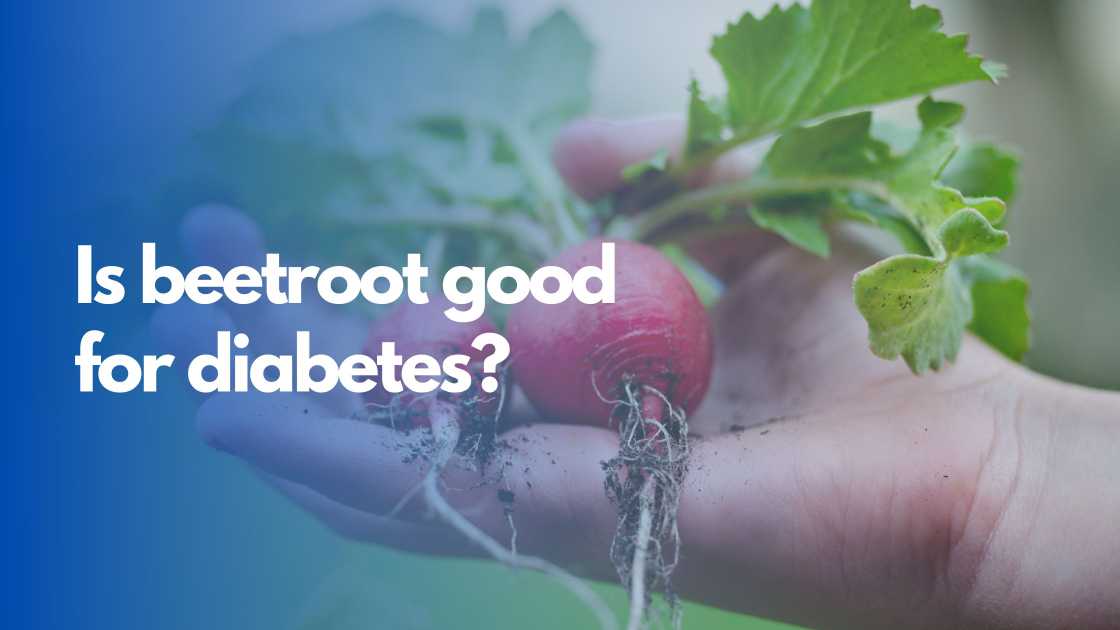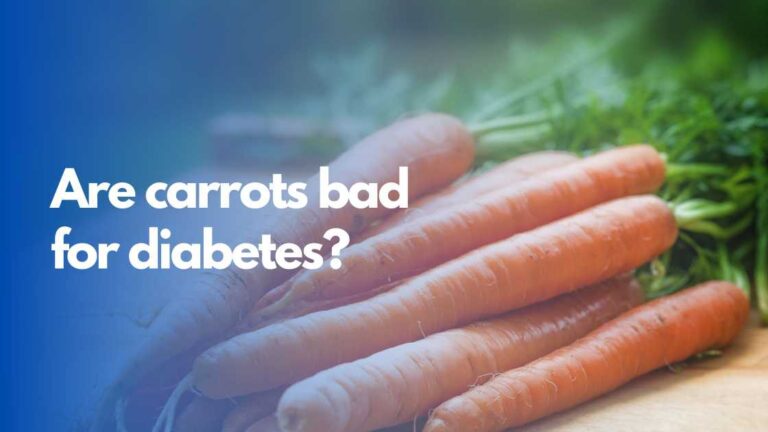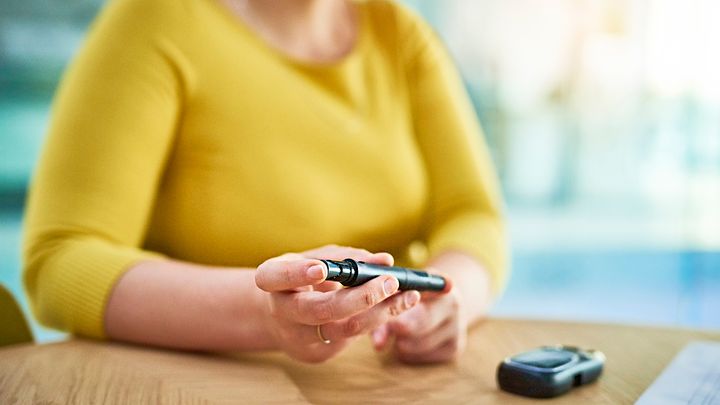If you have diabetes, you must always be vigilant about what you eat. While many people are scared of high-glycemic-index veggies for fear of blood sugar spikes, some of the most nutritious vegetables are also omitted from diets for the same reason.
Beetroot is one such vegetable.
Let’s take a look at if beetroot is really bad or good for diabetes. Stick around to the end of this article to understand whether you should or should not add beetroot to your diet.
Is beetroot good for diabetes?
Despite having a higher glycemic index of 64, beetroot is particularly helpful for diabetics because it has a low glycemic load.
Beetroots are a vegetable that is on the list of foods that diabetic people should consume. They are high in various essential nutrients that keep the body supplied and prevent the body from acquiring excessive blood sugar levels.
Many diabetics avoid beetroot because of their high natural sugar content. This vegetable, on the other hand, is more advantageous to them for several reasons. Why? Because:
Beetroots improve blood circulation
Blood vessel damage can occur as a result of diabetes. This can cause blood clots and disrupt blood flow. This is why persons with diabetes should consume this root vegetable.
It aids in the body’s blood circulation, helping prevent some of the possible cardiovascular complications. Beetroot contains nitrates, which aid blood vessels and improve blood flow.
Beetroot lowers the chances of nerve damage
One of the signs of diabetes is nerve damage. According to a study published in the International Journal of Endocrinology, a type of antioxidant that is present in beetroot called alpha-lipoic acid assists diabetics by preventing nerve damage.
Beetroots’ strong nitrate content can help diabetics enhance their cognitive function.
Beetroots boost Insulin Sensitivity for diabetics
It has the ability to improve insulin sensitivity in diabetics. This aids in the reduction of blood glucose levels. Beetroots contain metabolites that may help to lower insulin resistance.
Beetroot consumption with carbohydrates has been shown to reduce insulin resistance in obese patients in trials.
Furthermore, healthy persons who had beetroot juice during a meal had reduced glucose and insulin responses afterward.
Improves Your Exercise Capacity
Beetroots improve physical activity which also increases insulin sensitivity in the body. This aids in the better management of diabetes.
It also aids in blood glucose control and lowers the risk of nerve damage and heart disease. Diabetics should exercise since they are more susceptible to chronic ailments.
Beetroot juice improves your muscles’ ability to utilize oxygen, which increases exercise tolerance.
Blood Pressure is Reduced
High blood pressure is a common symptom of diabetes, particularly type 2 diabetes. This root vegetable, or its juice, is thought to help keep blood pressure in check.
Beetroot nitrates expand blood arteries and increase blood flow. If you have hypertension, it lowers your blood pressure. The juice of this root vegetable is also known to reduce systolic blood pressure.
According to a study, drinking one cup of beetroot juice every day lowers blood pressure in hypertensive persons.
Since most diabetics have hypertension as a comorbid condition, taking beetroots will both help with the diabetics as well as hypertension.
Beetroot reduces Blood Sugar
Although beetroots contain natural sugars, they do not readily convert to glucose. The vegetable is high in fiber, potassium, and folate, all of which are beneficial to diabetic patients.
Its phytochemicals have a blood glucose and insulin regulating action. Furthermore, experts recommend this root vegetable juice for diabetes because it contains the minerals betalain and neobetanin, which help to lower glucose levels.
In fact, a study indicated that drinking 225 milliliters of beet juice reduces post-meal glucose levels considerably.
Diabetes Complications are Reduced
Diabetes can cause health problems like kidney failure and heart attacks. It can harm blood vessels, as well as your eyes, heart, and other organs.
Beetroot antioxidants can reduce the risk of diabetes complications such as neuropathy, cardiovascular disease, retinopathy, kidney disease, and oxidative stress.
This root vegetable’s antioxidants aid in the reduction of free radicals that cause cellular harm. When free radicals inflict such damage, oxidative stress ensues. Beetroot helps to prevent diseases by reducing the danger of oxidative stress.
Cancer and heart disease are both caused by oxidative stress. Beetroot has chemicals that lower inflammation, which can lead to a variety of health problems.
If you have diabetes, can eating beetroot pose any risks?
If you have diabetes, there are no recognized dangers associated with consuming beetroot. The American Diabetes Association recommends eating beets.
The sole danger is beeturia unless you’re allergic to beets. This results in pink or red urine or feces. After eating beets, a tiny percentage of people develop beeturia.
Beeturia, while frightening, is usually not hazardous. It’s caused by one of the chemicals that give beets their color, and it normally goes away on its own.f
How to incorporate beets into your diet as a diabetic
Beets are highly adaptable, adding color, flavor, and crunch to a variety of recipes and beverages. Beets can be eaten raw or cooked in salads, stews, casseroles, and smoothies.
Remember to include the greens, which are high in nutrients and can be eaten similarly to spinach or kale. 8 grams of carbs are found in a 2-inch beetroot.
Purchase fresh beets with the greens still attached. Beets should be firm, smooth, and vivid red-purple in color.
Beetroot can be stored in the fridge for three or four days if the greens are kept intact. Beets can be kept in the fridge for two to four weeks without the greens.
Is the sugar content of beets high?
Beetroots are extremely nutritious and diabetic-friendly. Beetroots have a modest quantity of sugar and a high fiber content to help regulate it. Furthermore, they are minimal in calories.
What happens if you consume beetroot on a daily basis?
Beetroots are excellent for your health, and even better, they may be incorporated into your daily diet. They are harmless and do not cause any problems when used on a daily basis.
However, they must be used within specified parameters. A daily serving of 70–80 grams is sufficient for one day. It’s best not to overuse it because it could harm your health.
Summary
Beetroot is high in antioxidants and minerals that have been shown to improve overall health. Beetroot consumption is therefore very good for diabetics.
Beetroot help to prevent typical diabetes problems such as nerve and eye damage. They’re also adaptable, tasty, and simple to include in a variety of recipes.







Leave a Comment